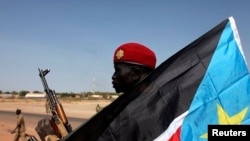JUBA —
South Sudanese officials said Friday they have intercepted 11 United Nations trucks carrying weapons, in violation of a U.N. rule that arms should be transported by air only in the country for security reasons.
South Sudan army spokesman Brigadier General Malaak Ayuen Ajook said the trucks were intercepted in Rumbek, in Lakes state, and will be held there until the government and the U.N. Mission in South Sudan (UNMISS) complete an investigation into the incident.
UNMISS said in a statement that "It is the policy of the United Nations Mission in South Sudan (UNMISS) that during the crisis in South Sudan all arms and ammunition for peacekeeping contingents are flown into respective areas of deployment and not taken by road. This is an important security measure."
The weapons belong to a Ghanaian battalion of peacekeepers that was on its way to Bentiu, capital of Unity state, UNMISS spokeswoman Ariane Quentier said. The Ghanaian troops are part of a surge being sent to South Sudan "to assist" the country during the crisis, the U.N. said.
The arms were in a shipment of "general goods" in which "several containers were wrongly labeled and inadvertently contained weapons and ammunition. This is regrettable," the UNMISS statement said.
"The U.N. headquarters intends to dispatch a high-level delegation or investigation team to look, with the government of South Sudan, into this matter," Quentier said, insisting that the incident would not affect the U.N.'s role in South Sudan.
"The UN is in South Sudan to support the government," she said, adding that the UNMISS would "remain impartial and... is not in South Sudan to take sides."
Relations between the U.N. and the government of South Sudan have been strained since violence erupted in Juba in mid-December and quickly spread around the country.
At the start of the conflict in December, the government accused UNMISS of sheltering rebels inside its bases. Tens of thousands of people have been given protection at U.N. compounds and bases since the fighting began.
In January, tensions rose when UNMISS barred access to its base in Bor to Information Minister Michael Makuei Lueth.
Quentier said at the time the minister was refused entry because his bodyguards were armed.
Days later, President Salva Kiir accused the United Nations of seeking to take over the young country, speculating that UNMISS may have pushed his political rival, former vice president Riek Machar, to rise up against him. Kiir dialed back his accusations a few days later.
South Sudan army spokesman Brigadier General Malaak Ayuen Ajook said the trucks were intercepted in Rumbek, in Lakes state, and will be held there until the government and the U.N. Mission in South Sudan (UNMISS) complete an investigation into the incident.
UNMISS said in a statement that "It is the policy of the United Nations Mission in South Sudan (UNMISS) that during the crisis in South Sudan all arms and ammunition for peacekeeping contingents are flown into respective areas of deployment and not taken by road. This is an important security measure."
The weapons belong to a Ghanaian battalion of peacekeepers that was on its way to Bentiu, capital of Unity state, UNMISS spokeswoman Ariane Quentier said. The Ghanaian troops are part of a surge being sent to South Sudan "to assist" the country during the crisis, the U.N. said.
The arms were in a shipment of "general goods" in which "several containers were wrongly labeled and inadvertently contained weapons and ammunition. This is regrettable," the UNMISS statement said.
"The U.N. headquarters intends to dispatch a high-level delegation or investigation team to look, with the government of South Sudan, into this matter," Quentier said, insisting that the incident would not affect the U.N.'s role in South Sudan.
"The UN is in South Sudan to support the government," she said, adding that the UNMISS would "remain impartial and... is not in South Sudan to take sides."
Relations between the U.N. and the government of South Sudan have been strained since violence erupted in Juba in mid-December and quickly spread around the country.
At the start of the conflict in December, the government accused UNMISS of sheltering rebels inside its bases. Tens of thousands of people have been given protection at U.N. compounds and bases since the fighting began.
In January, tensions rose when UNMISS barred access to its base in Bor to Information Minister Michael Makuei Lueth.
Quentier said at the time the minister was refused entry because his bodyguards were armed.
Days later, President Salva Kiir accused the United Nations of seeking to take over the young country, speculating that UNMISS may have pushed his political rival, former vice president Riek Machar, to rise up against him. Kiir dialed back his accusations a few days later.




